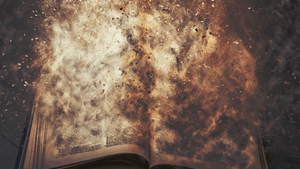Stay in the Loop
BSR publishes on a weekly schedule, with an email newsletter every Wednesday and Thursday morning. There’s no paywall, and subscribing is always free.
What would you save from the flames?
Readercon 27's panelists ask "Which book would you save?"

Ray Bradbury's 1951 novel Fahrenheit 451 portrays a future in which buildings are totally fireproof, books are illegal, and firemen have been given the job of burning the detested objects. At the end of the novel, the hero joins a band of rebels who keep books alive by memorizing them. Each member of the group has preserved one book.
The heat is on
In his introduction to its authorized graphic novel version, Bradbury threw out an invitation. "Finally, may I suggest that anyone reading this introduction should take the time to name the one book that he or she would most want to memorize and protect from any censors or 'firemen.' And not only name the book, but give the reasons why they would wish to memorize it and why it would be a valuable asset to be recited and remembered in the future. I think this would make for a lively session when my readers meet and tell the books they named and memorized, and why."
At Readercon, a Boston science fiction convention, I joined three other writers in a panel that took up Bradbury’s challenge. The conversation was just as lively as Bradbury thought it would be and there’s no reason it has to stop.
The choices of the Readercon panelists were all highly personal. The chosen titles reflected their interest in science fiction and fantasy, but they were also examples of the eclecticism and unpredictability that distinguishes science fiction and fantasy writers.
The final five
Samuel R. Delaney’s Dhalgren was considered obscure and strange when it hit the bookstores 40 years ago. The panelist who snatched it from the book burners was Eric Schaller, a professor of biological science at Dartmouth College and a prolific creator of dark fantasy. Schaller said it was the book that got him interested in science fiction when he was a teenager. Some books, it seems, really are ahead of their time.
The other prolific fantasy writer on the panel, L.J. Cohen, said Patricia A. McKillip’s The Riddle-Master is the one book she’s read dozen of times. She called it “a work of astonishing beauty and stunning worldbuilding, a story that takes the reader through despair and into hope. If there were to be some book-pocalypse, I think we would need to remember beauty. And it's a story that can be read by young and adult readers alike.”
Plato’s dialogues would make it through the book-pocalypse through the efforts of James Morrow, an elegant writer best known for a trilogy on the death of God that starts with the story of a sea captain who must tow the deity’s mammoth remains. Morrow is a resolute advocate of the rationality espoused by the Enlightenment; he sees the hero of Plato’s dialogues, Socrates, as a man devoted to the relentless search for truth. There was a general agreement Plato’s Republic probably wouldn’t be included in Morrow’s contribution since Plato’s ideal society rested on rigid censorship.
The moderator of the panel, Kate Nepveu, is a lawyer and book reviewer. She didn’t commit to a firm choice, but she suggested a portrait of the Americas before Columbus, 1491 by Charles C. Mann. She recommended it as “an intellectual tool which is about ways of doing history and how societies rise and fall, but is also incredibly entertaining.”
I decided on Cyrano de Bergerac through a process that started with War and Peace and traveled through Machiavelli’s Discourses and three of my childhood favorites: The Voyages of Dr. Dolittle, Felix Salten’s Bambi, and The Prisoner of Zenda.
Cyrano would be a great story to tell around the campfire when Bradbury’s booksavers hide in the wilderness. Every act evokes a different mood, from the swashbuckling comedy of its opening to the sentimental tragedy at its end. As rebels against a conformist society, the booksavers might be inspired by Rostand’s portrait of Cyrano as an uncompromising individualist, the writer who vows “never to make a line I have not heard in my own heart.”
Pick a book, any book
For all its charms, Cyrano isn’t in the same league as the dialogues of Plato. James Morrow is the only writer on the Readercon panel who chose a true classic. Should book savers limit themselves to some acknowledged list of Great Books? The panelists didn’t seem to think so. Runners up included Charles Darwin’s The Origin of Species and a cookbook that contained recipes from all over the world. I prefer a bottom-up approach but I can see the arguments for an organized effort.
What book would you choose if you could only save one book from the flames? Why would you choose it? Please note: You’re contributing to a library. You don’t have to choose the one book that can be used to restart civilization after it crumbles. If you’re a typical BSR reader, I suspect you’re already mulling over half a dozen titles. Let us know.
Sign up for our newsletter
All of the week's new articles, all in one place. Sign up for the free weekly BSR newsletters, and don't miss a conversation.
 Tom Purdom
Tom Purdom